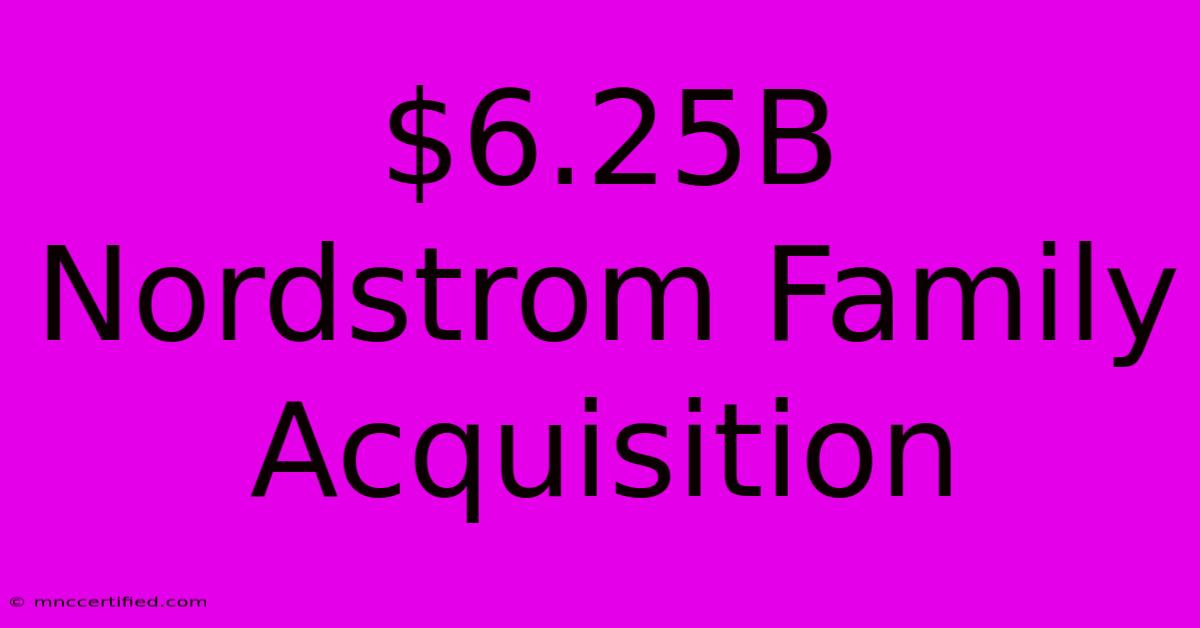$6.25B Nordstrom Family Acquisition

Table of Contents
Nordstrom Family's $6.25 Billion Acquisition: A Deep Dive into the Deal
The Nordstrom family's recent $6.25 billion acquisition of a significant stake in the publicly traded Nordstrom, Inc. sent ripples through the retail industry. This strategic move, orchestrated by the founding family, significantly alters the company's future trajectory and raises important questions about the future of family-controlled businesses in the age of modern finance. This article will delve into the details of the acquisition, examining its implications for Nordstrom, its stakeholders, and the broader retail landscape.
Understanding the Acquisition's Mechanics
The $6.25 billion acquisition saw a consortium led by the Nordstrom family, including members like Pete Nordstrom and Erik Nordstrom, acquire a substantial portion of the company's outstanding shares. This leveraged buyout (LBO) involved significant debt financing, showcasing the family's commitment and belief in the long-term potential of the iconic department store chain. The deal's success hinged on securing favorable financing terms, reflecting the family’s strong financial standing and the investors' confidence in Nordstrom's future prospects.
Key Players and their Roles:
- The Nordstrom Family: The driving force behind the acquisition, leveraging their deep understanding of the business and its challenges. Their involvement signifies a commitment to long-term value creation, potentially steering the company away from short-term pressures inherent in public markets.
- Investment Firms: While specific details about participating firms might be limited at this stage (requiring further research and fact-checking from reliable sources like the Wall Street Journal or Bloomberg), it's likely that several investment firms played crucial roles, providing the necessary capital for the LBO and expertise in navigating complex financial transactions. These firms carry a vested interest in the success of the acquisition.
Implications for Nordstrom, Inc.
The acquisition presents a mixed bag of implications for Nordstrom, Inc., posing both opportunities and challenges.
Potential Benefits:
- Strategic Restructuring: The family's control may facilitate much-needed strategic restructuring. This could include streamlining operations, focusing on specific market segments, or accelerating the company's digital transformation. Private ownership often allows for bolder, long-term strategies that may be constrained by public market scrutiny.
- Reduced Pressure from Short-Term Investors: Freed from the demands of quarterly earnings reports, Nordstrom can focus on sustained, long-term growth, potentially investing in innovation and brand building without constant pressure to meet short-term profit targets.
- Increased Investment in Omnichannel Strategy: With a renewed focus on profitability and long-term vision, investment in enhancing the omnichannel experience – blending online and offline retail – will likely be a priority. This strategy is crucial for success in today's competitive retail market.
Potential Challenges:
- Debt Burden: The substantial debt incurred to finance the LBO presents a considerable financial burden. Managing this debt effectively will be crucial for the long-term health of the company. This requires careful financial planning and execution.
- Adapting to Changing Consumer Preferences: The retail landscape continues to evolve rapidly. Nordstrom will need to adapt quickly to evolving consumer preferences and emerging competitive threats from both online giants and other brick-and-mortar stores.
- Maintaining Employee Morale: Changes in ownership and restructuring can impact employee morale. Maintaining a strong and motivated workforce will be crucial for the successful execution of the family's strategic vision.
Broader Implications for the Retail Sector
The Nordstrom family acquisition sets a precedent for other family-controlled businesses in the retail sector. It highlights the importance of family legacy and long-term vision in navigating the challenges of the modern retail market. The success of this deal will be closely watched by other family-owned businesses contemplating similar strategies. This situation could potentially spark a trend of family buyouts in other public companies within the retail and related sectors.
Conclusion: A Pivotal Moment
The Nordstrom family's $6.25 billion acquisition marks a pivotal moment for the company and the retail industry. While significant challenges remain, the family's deep understanding of the business and their commitment to long-term growth provide reason for optimism. The ultimate success of this ambitious undertaking will depend on skillful execution of a well-defined strategic plan, mindful debt management, and a keen understanding of the ever-shifting dynamics of the modern retail landscape. Only time will tell whether this bold move will revitalize Nordstrom or lead to unforeseen challenges. Continued monitoring of the company’s financial performance and strategic decisions will be essential to assess the long-term impact of this acquisition.

Thank you for visiting our website wich cover about $6.25B Nordstrom Family Acquisition. We hope the information provided has been useful to you. Feel free to contact us if you have any questions or need further assistance. See you next time and dont miss to bookmark.
Featured Posts
-
Red Sox Sign Buehler One Year 21 M
Dec 24, 2024
-
Walmart Christmas Eve 2024 Hours
Dec 24, 2024
-
Spurs Game Embiid Ejected
Dec 24, 2024
-
Cowboys Eagles Time Change 1 Pm Kickoff
Dec 24, 2024
-
Nolans Next Film Epic Book Adaptation
Dec 24, 2024